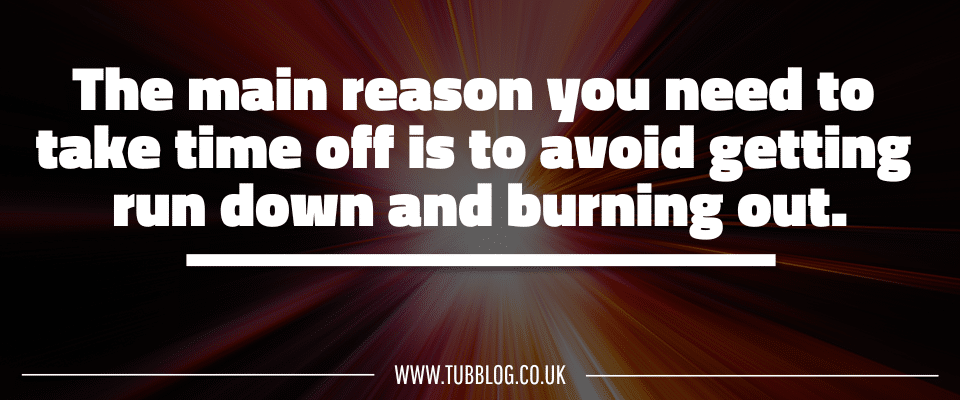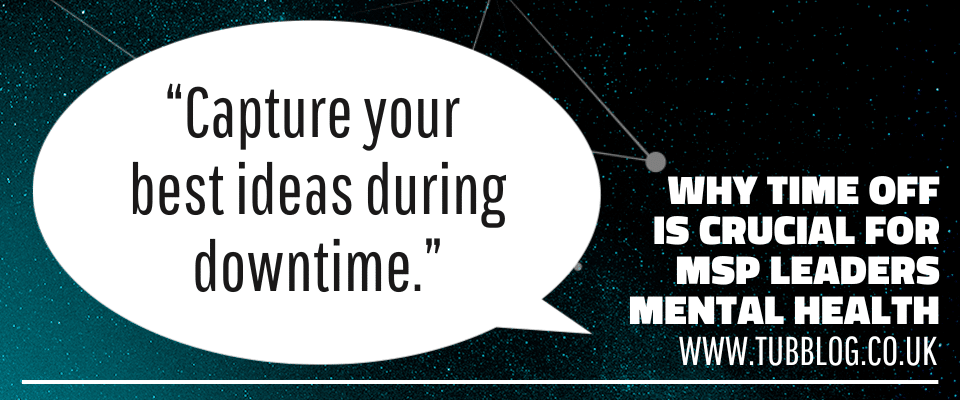As usual, the British summer doesn’t seem to know what it wants. Heating and jumpers on one minute, and then windows down and jackets off in beer gardens the next.
However, whatever the weather does, the schools will be closed for six weeks and the motorways will be full of cars at a standstill. Holidays will be happening regardless of sunshine and showers.
So as a busy MSP (managed service provider) owner, are you planning to take a week or two off, or are you ignoring the call of the beach in order to keep working? If you have small children you may not have a choice, but even so you may end up taking your laptop and smartphone away with you.
Here at TeamTubb, we’re big believers in the importance of everyone taking time off, even the leadership. Richard himself has taken the summer off in the past, trusting us to keep things ticking over.
But if you’re reading this and thinking: “There’s no way I could take a holiday, even if I wanted to. The business needs me to be present at all times, then I’d urge you to have a rethink.
![]()
Downtime is Normal
Taking time out and away from your business isn’t a bad thing. Paid vacation leave has been available to British employees since 1938, so even the government thinks we should have a break now and then. And not just on the bank holidays!
If you really don’t think you could take a full fortnight out, then why not plan some long weekends or city breaks? Book with a friend or your family, so you’re committed to them and won’t let them down. Plan in advance so you can let the team know.
And depending on your longer-term plan for the business, this could also be a good opportunity for you to step away from some of the day-to-day tasks you’re intending to pass over eventually.
You might want to move to a four-day work week, so perhaps you can try it over the summer. Wherever possible, try to tie it in with a regular event (an evening class, a gym session) so that you’ve got an external obligation to not be at the office.
Avoid Burnout by Taking Time Off
The main reason you need to take time off is to avoid getting run down and burning out. This is very common in self-employed people, especially when they’re new to business. Just last month, Wifi Statistics’ website WifiTalents reported that 60% of entrepreneurs said that not only had they suffered with burnout, but that it had impacted on their mental health.
And burnout is not only difficult to manage at the time, but can have a massive impact on your future health and wellbeing, as well as on your business. You might not realise until later on the full extent of its effects.
No job, even if it’s being the CEO of your own company, is worth your health. Depending on what happens, you may be off sick for several months. This may affect your income and also make it harder for you to pay your staff. If you don’t have key person insurance or similar, you might feel obliged to get back to work sooner than you’d like.
Be kind to yourself and start to look into mindfulness practices – having a week or so away from the business might be the ideal time to introduce meditation, a lunchtime dog walk or a yoga class. Wherever possible, we want to prevent burnout, not treat the after-effects. And remember to encourage your team to do likewise.

You’ve Built the Team, Now it’s Time to Trust Them
If you’re no longer operating as a break/fix one-man band and have embraced the MSP model, then you’ll have at least a couple of engineers in your employ. You’ve spent time recruiting and training people to deliver your services to the same standard you do, right?
So in that case, let them run the business for you while you’re away! It can be hard to let go of the reins when it feels less like a company and more like your baby, but that’s the whole reason you’ve got a team.
Make sure you’ve got everything in place for them before you take time off (we’ll be covering this in a future post) and, more importantly, set some boundaries. Let them know if, how and when they can contact you, or who to go to in case of something urgent.
Encourage them to take ownership of both current tasks and new things that might arise when you’re absent. And make sure they’re comfortable with saying no to clients – and not sharing your personal number with them either!
Showing your team that you trust them to run things without you will really make them step up their game to deliver for you. And it increases their job satisfaction, too, making them more likely to stick around.
Have Creative Ideas and Find Inspiration During Time Off
I’m a small business owner myself, and I find that when I’m out of office and *technically* not working (because I’m never completely switched off!) I have my best ideas.
If you also find your downtime is when you have your best ideas, come up with a way to capture those. If you’re analogue (and you might decide to take a digital break as well as a physical one), have a pen and notebook to hand.
Or, you might prefer to record your ideas as a voice memo or note on your phone. If you do decide to capture your thoughts on the computer, try to stay away from email and work communication channels! You might allow yourself 20 minutes a day to add things to your digital to-do list.
And make sure that you schedule some time to review these ideas when you get back to work. Put it in your calendar to do when you’re checking your newly-filled inbox, and if you need help from a team member, let them know while the idea is still fresh in your mind.

Come Back Refreshed From Your Time Off
Whether you had a staycation, a city break or an exotic holiday, you will hopefully feel relaxed and refreshed when you get back to the day job. Having time to yourself might have stimulated new ideas, but it might have also adjusted your perspective on existing things, too.
Perhaps something that felt like a challenge before you went away now seems more manageable. You might decide that it’s time to get rid of that difficult client, offer a new service, expand the team or adopt a new way of working.
Whatever it is, you should really notice the difference when you come back after time out. Now is a great time to re-evaluate and redefine your quarter 4 goals so you can end the year strong. And make the time to have the festive period off too!
Are you taking time off this summer? Let us know in the comments how you’re preparing for the holidays.















Comments